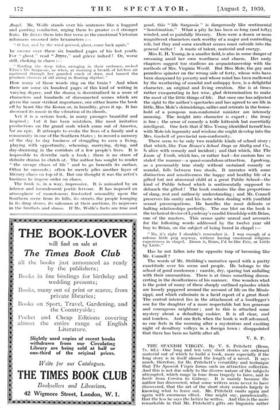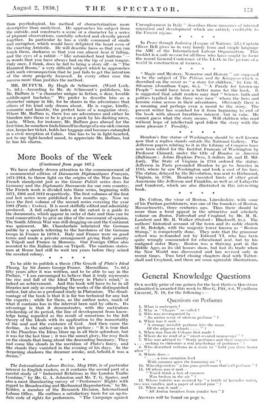THE SPANISH VIRGIN. By V. S. Pritchett (Senn. 7s. Cal.) — One
long and ten very short stories are awkward material out of which to build a book, more especially if the long story is in itself almost the length of a novel. It says much, therefore, for Mr. Pritchett's versatility and technique that The Spanish Virgin forms such an attractive collection. And this is not due solely to the diverse nature of the subjects attempted, which range in tone from tragedy to farce, and in locale front Corsica to Galway. It is mainly because the author has discovered, what some writers seem never to have discovered, that the art of the short story consists largely in knowing what to leave out. Mr. Pritchett omits again and again with enormous effect. One might say, paradoxically, that the less he says the better he writes. And this is the more remarkable in that Mr. Pritchett's gifts are linguistic rather
than psychological, his method of characterization more descriptive than analytical. He approaches his subject from the outside, and constructs a scene or a character by a series of piquant observations, carefully selected and cleverly pieced together. In particular he has a virile command of simile and metaphor, which would have delighted the heart even of the exacting Aristotle. He will describe faces so that you can touch them, darkness so that you can almost hear it falling, and the eyes of a rabbit—" like astonished boot buttons "- in words that you have always had on the tip of your tongue. Only once, I think, does he fail to bring a story off—in " The Haunted Room," a very difficult subject which he approaches with such circumspection that he just fails to get the intention of the story properly focussed. In every other case the success more than justifies the method.

































 Previous page
Previous page